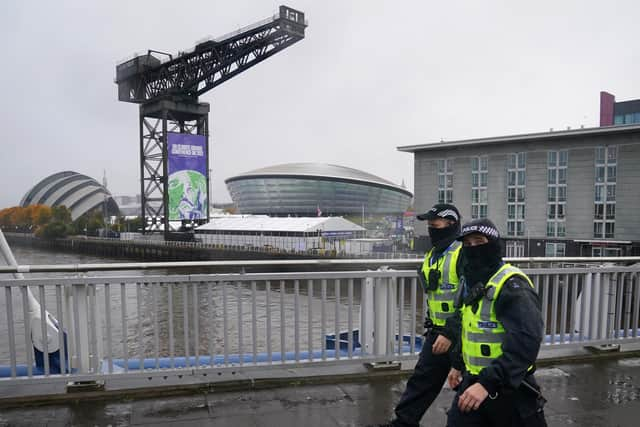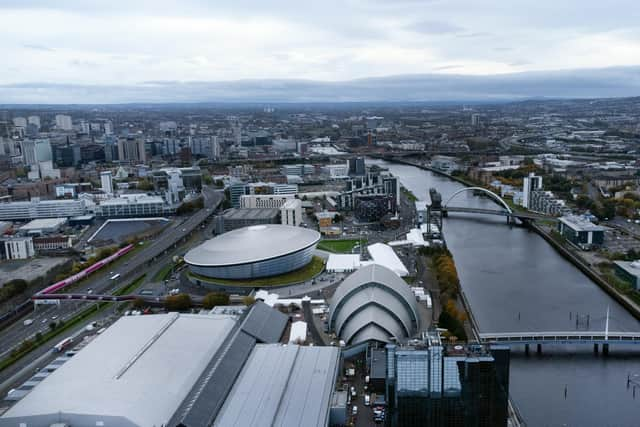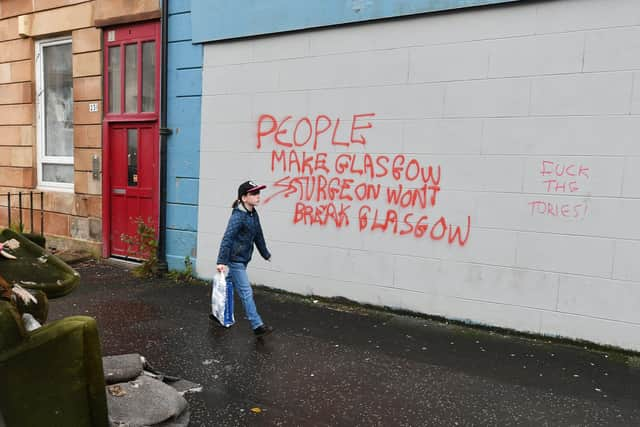Glasgow is not the dump some would have us believe but it could - and should - be in a far better state - Euan McColm
I quickly discovered the man interviewing me in our kitchen was a fellow Glaswegian. “Do you miss the place?” he asked and off we went on a tangent, sharing thoughts about our favourite parts of our hometown.
Our chatter was overheard in the front room where a female officer and my other half, eyes almost rolling out of their heads, shook their heads at the predictability of it all. Oh, God, went their reaction, there’s two of them.
Advertisement
Hide AdAdvertisement
Hide Ad“Once you get him on the subject of Glasgow, ” said the cop. “Tell me about it,” said my fiancee.


The weary disdain of his colleague and my partner was, I freely admit, completely understandable. When it comes to cloyingly sentimental self-mythologising, we Glaswegians take some beating. Ours, we will tell you, is a peculiarly beautiful city with a people of unparalleled decency and kindness. We run towards trouble, eager to help, we band together in support of the oppressed, and we struggle to get a bad curry anywhere. The Glaswegian in full exceptionalist flight makes the Liverpudlian seem like a shrinking violet. That’s how truly irritating we can be.
I suppose First Minister Nicola Sturgeon was banking on this Glaswegian mentality when, last week, she accused Scottish Labour leader Anas Sarwar of “talking down” the city.
Sarwar, in common with other opposition politicians and a number of trade union officials, had - in advance of the COP26 conference on climate change which begins today - been talking about the grim state of the city. Is Glasgow - with rubbish piled high and infestations of rats - really at its best as political leaders and environmental experts descend upon it?
Sturgeon tried to characterise criticism of her party’s stewardship of the city (the SNP has run Glasgow City Council since 2017) as an attack on Glasgow itself. It’s a tired old nationalist tactic and I’m not sure it worked.


It is, undeniably, true, that parts of Glasgow are in a disgusting state, right now. The GMB speaks of rat attacks on council workers and anyone with eyes to see may witness rubbish strewn streets and dilapidated Victorian buildings left to rot while cheap apartment blocks scar the skyline in the name of easy profit for rapacious developers.
To describe Glasgow’s problems and demand action is the opposite of talking down the city. Anyone who cares about Glasgow should be discussing these issues rather than pretending everything in the chip shop is fresh out of the fryer.
In saying that, Labour is on pretty shaky ground when it comes to this issue, After all, for decades before the SNP took control of the city chambers, Labour ran the show. Years of decline, which continue under the SNP, began with Sarwar’s party.
Advertisement
Hide AdAdvertisement
Hide AdBut the nationalists are running things, now, and the buck stops with them.


There is, of course, a substantial dollop of politics in the current row over the state of Glasgow, It's not, quite, the hellhole described by opposition politicians but nor is it anywhere near its best.
It’s not difficult to see how Scotland’s greatest city (I will brook no dissent) arrived at this sorry pass. Towns and cities across Scotland have struggled similarly in recent years.
On winning the 2007 Holyrood election, the SNP implemented a council tax freeze which would last for nine years. Of course, this was a hugely popular measure with those whose bills were highest. The wealthy owners of grand villas in Bearsden and townhouses in Edinburgh’s New Town made huge savings over the best part of a decade and while this might have drawn many to the SNP, the consequences of this policy can be seen across the country.
Because politicians tend to direct their policies at those most likely to turn out and vote, the cuts required to sustain the council tax freeze were directed at services used by those who - I’m afraid - don’t really matter. Support services used by the poorest were first for the chop. Run down areas - already suffering from decades of municipal neglect - slipped further down the list of priorities.
It is, however, one thing to identify a lack of investment as the root cause of a city’s problems and quite another to talk about the solution.
During her brief stint as leader of the Scottish Labour Party, former MSP Johann Lamont raised the issue of how exactly a range of universal benefits could be paid for over the long term. For daring to point out that, for example, giving free prescriptions to wealthy people has a cost, Lamont was utterly monstered by opponents. Here, said the SNP, was proof that Labour wanted to strip benefits from needy Scots.
Lamont was actually arguing for a sharper focus on helping those most in need. But why have a complicated discussion about taxation and the redistribution of wealth when there's a cheap point to win?
Advertisement
Hide AdAdvertisement
Hide AdGlasgow - in common with the rest of the country - really could do with new investment. If we want the city to shine, then that comes at a cost.
Delegates at COP26 will see a city with problems but they will also see a place rich with extraordinary architecture and glorious open spaces. They will meet great people and they will struggle to find a bad curry.
Glasgow is not the dump some would have us believe but it could - and should - be in a far better state.
And, if we want that improvement to happen, the first step must be to discuss raising taxes and directing the money to the most deprived parts of the city.
If you’re waiting for that to happen, don't hold your breath.
A message from the Editor:
Thank you for reading this article. We're more reliant on your support than ever as the shift in consumer habits brought about by coronavirus impacts our advertisers.
If you haven't already, please consider supporting our trusted, fact-checked journalism by taking out a digital subscription.
Comments
Want to join the conversation? Please or to comment on this article.